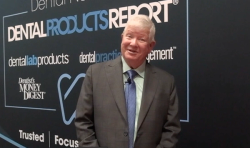- About Us
- Advertise
- Editorial
- Contact Us
- Terms and Conditions
- Privacy Policy
- Do Not Sell My Personal Information
© 2025 MJH Life Sciences™ and Dental Products Report. All rights reserved.
Video Series: How to empower your practice with social media
Social media isn’t just for Justin Bieber and Obama: Dental professionals are using Facebook, Twitter and other platforms to boost their business and attract patients. We talked to three of the most socially savvy dentists to see how they got their clout.
Social media isn’t just for Justin Bieber and Obama: Dental professionals are using Facebook, Twitter and other platforms to boost their business and attract patients. We talked to three of the most socially savvy dentists to see how they got their clout.
Dr. Gregory Cole, @Flap
The California-based dentist known as “Dr. Flap” in the blogosphere, maintains more than one website and keeps up with 36,000 Twitter followers and 2,400 Facebook friends on his personal page.
While the 61-year-old, white-haired Cole perhaps isn’t your typical image of a social media guru, recent reports say otherwise. The 55-plus demographic is the fastest-growing group of Facebook users with nearly 10 million users in 2010, up from 1 million in 2009, according to iStrategyLabs, a digital agency that tracks Facebook trends.
“I see dentists in their 70s on Facebook and Twitter,” Cole said, who owned a private practice for 24 years. “Most people realize that you’re either a part of the Internet conversation, or people are talking about you without your participation.”
Cole, who often updates his Facebook page a dozen times a day and tweets twice as much, says he’s found social media success and followers by varying his content and “writing from the heart.”
“You’ll see I’m a dentist, but I’m also a real person,” he said, adding that he posts about his hobbies like running. “People want to associate with real people.”
Ignoring the advice of some social media consultants, Cole also puts his politics on his page.
There've been some discussions as far as dentists being involved in certain topics, and you shouldn’t discuss politics or religion,” said Cole, who calls himself a conservative Christian on his Twitter profile. “But if you’re going to be a real person, I think you have to be honest through your social media.”
Cole has also taken to newer social media platform Pinterest, a pinboard-style photo-sharing site.
“It seems to drive a lot of traffic because it’s very visual,” Cole said. “If I had to do it over again, early on I would be more visual on Facebook and blogging.”
Dr. Thomas P. Connelly, @Dr_Connelly
The New York-based dentist, who specializes in cosmetic and restorative procedures, said he receives almost all of his patient referrals from the Internet. “About 57 percent from Google search, about 20 percent from Facebook and 18 percent from Twitter,” he said, “that’s why we take social media so seriously.”
Since stepping into the social media sphere three years ago, Connelly, 39, has attracted 16,000 Twitter followers – many who found him though the oral health-care blog he pens for The Huffington Post.
Still, Connelly keeps his dental-focused Facebook and Twitter conversations to a minimum.
“If you’re a regular person and not a dentist, following a dentist can be extremely annoying,” he said. “I don’t think people really care about teeth that much in the social media world.”
Connelly recommends following users you find interesting, reading what they post and using similar tactics as a way to formulate your social media identity.
“You have to imagine yourself being a non-dental person,” said Connelly, who often retweets news and scores from pro hockey teams his patients play for. “You have to remain interesting -- whether it’s sports, television or something that you do that’s unique, and then sprinkle a little dentistry in there.”
Dr. Todd Welch
The periodontist in Tennessee updates his The Science of Dentistry Blog several times a week along with his Facebook and Twitter accounts, with 5,400 and 11,000 followers, respectively, all to rank higher in Google.
“My whole goal is when people type in gum disease or implants in a certain area that I would be the first name that popped up,” he said. “It’s nice to have a website but they’re static pages – they don’t change much -- and with the blog, Twitter and Facebook, there are multiple ways to link into your website.”
Welch tends to keep his posts mostly professional offering techniques related to particular procedures.
“It’s gotten my name out there with other dentists,” said Cole, who’s been practicing eight years. “We get questions and comments from dentists around the country we get a call almost every day about implants and cases.”
Welch also maintains a YouTube channel with about 20 videos, mostly of implants and periodontal procedures (plus a clip from Friends starring Ross' weirdly whitened teeth).
“It’s just another piece of the puzzle to link to my name and my practice,” he said.
But it’s the names Welch would change if he had the chance to do it all again. “I’d change the domain names for my website and my blog,” he said. “It’s got to be really keyword specific.”



